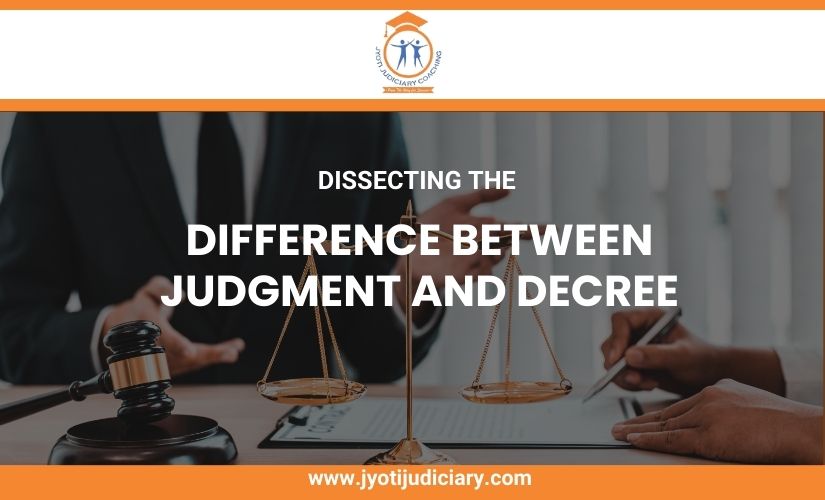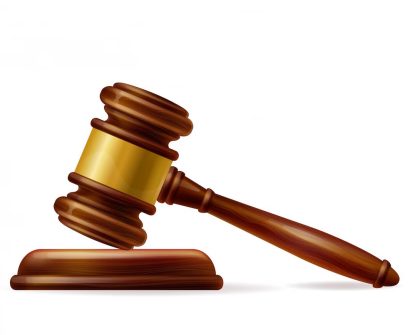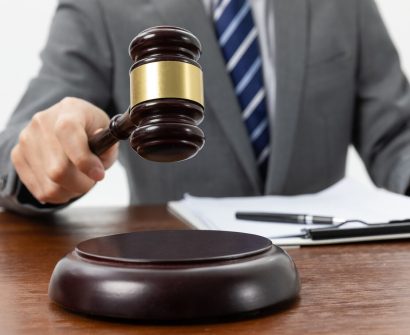
The term “law” describes the body of rules that govern conduct in people. These rules rest on different interpretations of equity, justice, and equality. Legislative decrees are official, binding orders that outline the responsibilities and rights of the involved parties. Conversely, a judgment is a ruling made by the court in compliance with a directive or decree.
Thousands of cases are heard in court each day, and decrees are issued following judgments. A decree is not created on the day the judge formally signs and seals it; rather, it is created on the day the judgment is issued.
Judgment meaning
- The judgment in cpc is mentioned under Section 2 (9) of the act.
- In essence, a judgment is a court’s or tribunal’s decision in a case that specifies the rights and obligations of each party. A final decision rendered over the course of the legal processes frequently settles a dispute and ends the case.
- The ruling specifies the victorious party and the remedies granted to them.
Decree meaning
- The decree in cpc is mentioned under Section 2 (2) of the act.
- A decree is defined as an official and authoritative order or sentence that was legally articulated in court, understanding all pertinent issues and setting forth the rights of the plaintiff and defendant, following the rendering of a judgment in a lawsuit.
- It is a ruling rendered by the court that describes the legal implications based on the presented facts, witnesses, and evidence.
Difference between Judgment and Decree
The difference between judgment and decree are as follows:
JUDGMENT | DECREE |
It is a formal decision rendered by a judicial court. | It is a formal order from a court of law. |
A judgment is supported by facts. | A decree has a judgment as its foundation. |
A judgment includes the case facts, the issues raised, the evidence presented by the parties, and the conclusions drawn from the evidence and arguments. | The suit’s decision is contained in a decree, which also definitively establishes each party’s rights to the problems raised by the suit. |
“Formal” is not included in the definition of “judgment” provided in section 2(9) of the Civil Procedure Code of 1908. | “Formal” is included in the definition of “judgment” provided in Section 2(2) of the Civil Procedure Code of 1908. |
A judgment is always final even though it may lead to a preliminary decree, final decree, or order on its own. | The decree could be partially preliminary and partially final, preliminary, or final. |
After the decree is prepared, the judgment results in the suit’s ultimate resolution. | Since the court has the final say over the parties’ rights, the suit is closed after the decree is issued. |
The decision is made by a judge or a bench of judges. | The decree is judged or judicially endorsed. |
Judgment and decree: Positive and Negative Effects
Positive Effects
Judgment:
- It grants rights and legal status to the parties engaged in the case, serving as the fundamental basis for any further legal actions.
- The judgment is delivered with great clarity, assisting the interested parties in moving forward and planning for their future.
- It creates a precedent for any future instances, ensuring consistency in the application of the law.
Decree:
- Decrees can help ensure a fair and consistent conclusion by providing clear instructions on how a dispute should be settled.
- Because they do not require formal trials, they are an effective and efficient technique for quickly resolving problems.
- The power and authority of the court make them binding, implying that the parties must follow the ruling or face penalties or other repercussions, such as jail time.
Negative Effects
Judgment:
- Getting a judgment requires patience and takes time.
- A judgment is necessary for the matter to be completed, and the parties may have to wait a long time for only one.
- In addition to making the individuals engaged in the case feel emotionally upset, the process of getting a judgment can be expensive.
Decree:
- Since decrees are not subject to public review or debate, the public may not support them as much as they should.
- It could be difficult to annul or rescind the decrees, which makes holding the President accountable for their actions difficult.
Any layperson must be able to understand the essence of judgment and decree. In summary, therefore, a court’s decision or order frequently has a fantastic influence on maintaining the limits and authority of any individual.
Judgment and Decree FAQs
1. What are the essential of decree order and judgement?
The decisions rendered by a court of law are called orders or decrees. A court judgment, which is rendered subsequent to the matter’s hearing, comes after a decree. It’s important to remember that decree and order are synonymous. A decree or order may be the basis for a judgment rendered by a court of law.
2. Is decree passed after judgement?
A judge’s remark alone cannot be interpreted as a decree. The decree needs to be drafted independently and comes after the ruling. There is not even the slightest possibility of an appeal from the verdict in the absence of a decree. If the decree is not formally based upon the judgment, there is no appealable matter against the judgment.
3. What is the conclusion of judgement and decree?
Judges make official decisions known as court judgments, while they give formal orders known as court decrees. In essence, a judge decides a case’s conclusion as well as each party’s rights and responsibilities.
4. What is the principle of decree?
Only in cases when the plaint is presented at the beginning of the litigation is a decree passed. Both a proceeding started on a petition application and a suit brought on plaint may result in an order. Parties to a dispute have their rights definitively determined by decree.
5. How long does a court decree last?
Article 136 of the Limitation Act stipulates that any decree, with the exception of mandatory injunction decrees, must be executed within 12 years. On the other hand, Article 137 of the Limitation Act states that any “application” for which a time limit is not specified must be filed within 3 years.
6. Is decree passed after judgement?
- Both have to do with contentious issues.
- Both are formal declarations of decisions made by a Court of Law;
- both are decisions rendered by a Civil Court (in a lawsuit).
7. Which court can execute a decree?
A decree may be carried out by the court that issued it or by another court to which it has been transferred. It is important to notice that section 37 defines “Court which passed decree” to include those courts other than the one that actually passed the decree.
8. Can a court decree be challenged?
Any such judgment or decree may be challenged by the aggrieved party by submitting an application for leave to appeal.
9. Does judgment come first or decree?
The Decree is issued after the Judgment. A decree is an order given by a judge to a party. A decree might be something along the lines of directing someone to fulfil a duty, make a payment, etc. It is the process of figuring out each party’s obligations and rights in a lawsuit.
10. Can decree be modified?
The Indian courts allow for the modification or amendment of decrees. In the event that circumstances change or emerge, the trial court has the authority to modify or amend a preliminary decree. Additionally, the court may change under certain legal provisions.
With the goal of giving students the best coaching available for law entrance exams including the CLAT, AILET, and various other numerous state judiciary exams, Jyoti Judiciary Coaching, India’s Finest educational Platform, was established. Come enrol now with Jyoti Judiciary!
For any latest news, legal topics, judiciary exams notifications, patterns, etc watch Jyoti Judiciary’s YouTube channel for legal videos for any updates at https://youtube.com/@jyotijudiciarycoaching4852?si=2cwubh9d2A9urwJf









